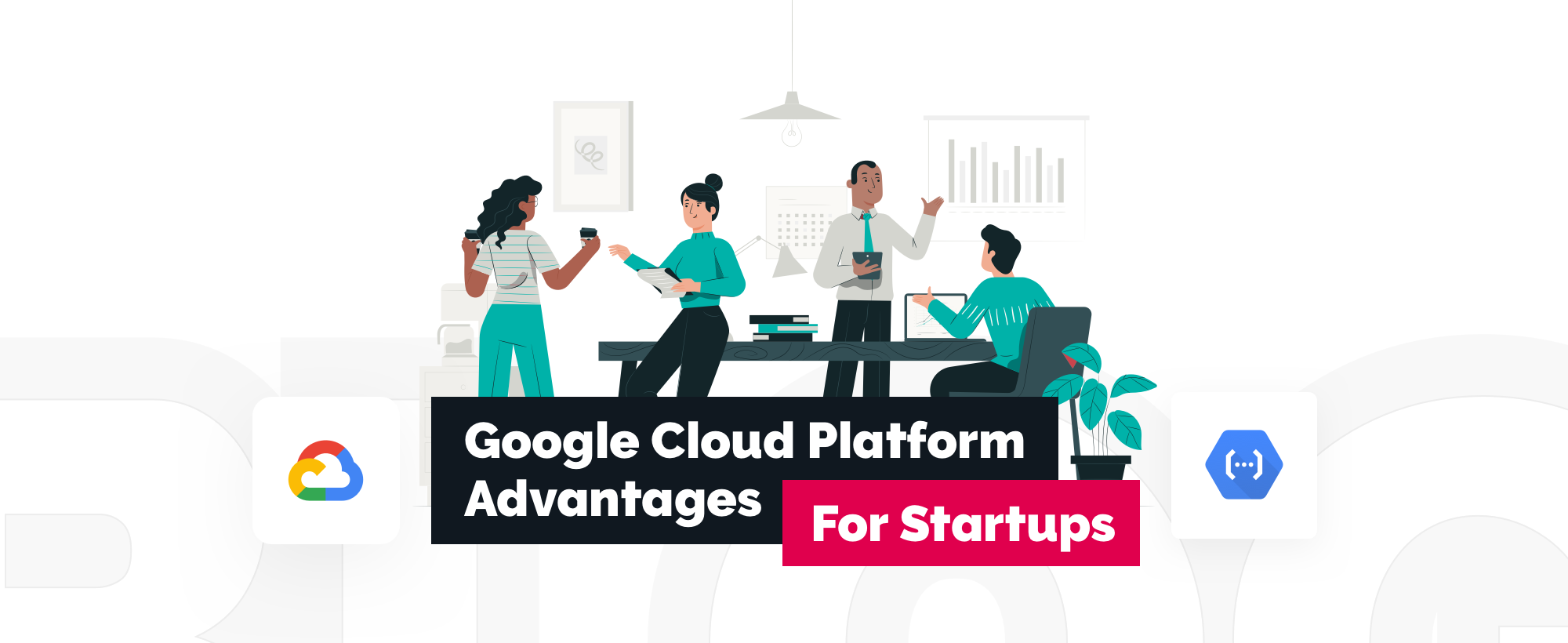Why GCP Is The Best Cloud Platform for Startups? 5 Google Cloud Platform Advantages

Web Expert at Techmagic, full-stack developer, coach and speaker. Passionate about JavaScript, Cloud Computing and Serverless.

Why migrate to the Google Cloud services for startups? Learn the benefits and how to get access to the best G Suite cloud computing tools.
Startups are incredibly active in adopting Cloud technology. The reason is apparent: small businesses can't or don't want to invest in their in-house servers — they are too expensive and difficult to maintain. Instead, startups prefer using a ready-to-go Cloud infrastructure, owned by technological giants. We prepared a guide to Google Cloud for startups, its features, and benefits.
The most popular Cloud computing providers are Amazon, Microsoft, and Google. All three have special programs for startups, growth initiatives, and discounts. However, Google Cloud stands out among the others — the company even launched a separate offer for startups and offered one of the best pricing tiers in the game. Let's take a look at what Google Cloud for startups has to offer.
Products available in Google Cloud Platform
Google Cloud for app development offers more than 90 products, all of which can be broken down in 7 main categories. So, what is Google Cloud for startups?
- Computing and storage: Google Cloud allows deploying code in Ruby or Node.js, Python, Java, Net, and Go. Its computing engine supports virtual machines on Linux and Windows.
- Database management: The data can be stored in MySQL and Cloud Bigtable, a Google-supported NoSQL database. Additionally, Google offers a datastore for free and a local SSD. You can store information for web apps, desktop software, and mobile apps.
- Operations: You’ll also find a set of tools for performance management and monitoring, Cloud logging, Google cloud console for startups, system tracking, and error detection. You can check audit logs, use a built-in debugger, monitor software's services and active workloads. The system automatically creates reports on the entire development process and data consumption.
- Networking: Google offers services for sharing text and media content, VPN services, private cloud, and enterprise connectivity tools. You can also check the safety of all network connections and protect your software from DDoS attacks with Cloud Armor.
- API management: Google Cloud allows connecting, building, and managing API, deploying them directly on Google's servers. Additionally, you can set up monetization streams, get reports on APIs functionality and revenue, and detect performance issues. If you are working in finance or healthcare, you'll also be able to use custom development services for HealthTech and FinTech.
- Security: the infrastructure is equipped with security scanners, management and command centers, threat detections tools, binary authorization settings, and instruments for information loss prevention.
- Developer tools: software developers can edit Google Cloud settings in command lines or Kubernetes IDEs. You can work with Visual Studio, App Engine, Eclipse IDE, and Windows Powershell.

Google Cloud Platform Program for Startups
In a nutshell, the Google Cloud startup program offers entrepreneurs to get services worth $100,000 for free, along with 24/7 support. After the trial is done, the Google Cloud price for startups will be lower than in the general tier. Google Cloud Platform for startups bills users for the number of services that they used, so the startup is the one to decide how long this trial version will last. All 90 instruments available in the full version are accessible by the rules of the program.
Startups that use Google Cloud Platform
Mito.ai
A Norwegian startup used Google Cloud platform to host its data processing software. The startup offers a series of products for social listening, which is why their platforms deal with terabytes of unstructured data content on a daily basis.
The company used Google Cloud services for startups to deploy their social listening software and manage data. As a result, the company saved its costs, increased throughput by three times, and now is predicted to reach the market worth of more than $8 million in 2022.
WeVideo
The team behind a Cloud-based platform for video creation decided to switch to Google IT services for startups to organize media data and run big data algorithms, enabling a higher personalization level. The company used BigQuery to collect user data, G Suite for internal communication and management, and Firebase for fast software deployment. Even though this Google platform takes time to get used to, Firebase for startups brings in a lot of benefits.
As a result, the team achieved a 30% reduction in data processing costs and used Google Cloud infrastructure for startups to power marketing activities which led to a 2% increase in the conversion rate. Now the company has a 50-person team that collaborates via Google Suite and uses Google Cloud tools for their development needs.
Torch
An AR platform for developers that build immersive 3D applications for desktop, smartphones, tablets, and headsets. Currently, the platform supports more than one billion devices, which posed challenges in data processing and storage.
The team used Google Cloud to build and deploy new apps, set up seamless dataflow, and host a new UI technology. With Firebase, the team’s developers can quickly write and deploy code, while WebGL is responsible for 3D rendering. The company was able to release a new product and Ui elements with Google Cloud tools and continue using these instruments for further development and internal operations.

Google Cloud vs. AWS Platforms for Startups
Google Cloud is quickly getting the interest of startups. Even though AWS still is the most popular Cloud infrastructure, the attention to Google's services is growing fast. When putting Google Cloud vs AWS, Google Cloud is often considered to be the best Cloud provider for startups, even in comparison with a more popular AWS. So why should startups use Google Cloud platform solutions?
Feature comparison
Let's take a look at the key characteristics of both platforms to determine which one is best for startups. This hugely depends on the structure and purpose of your software, but we'll strive to create an objective bigger picture.
Computing power
Google Compute Engine based its virtual machines on KVM to create and support VMs. The engine supports Linux and Windows. Users can choose a different number and type of VMs depending on the project needs. Google Engine can handle up to 160 CPUs and 3,844 GB of RAM.
AWS uses Xen to run and support its virtual machines. Similarly to Google Cloud, their VMs can be based on Linux or Windows. Technical characteristics, however, are slightly different. AWS allows working with 128 CPUs and 3,904 GB of memory.
Overall, Google Cloud computing for startups is more powerful but also, it offers more customization options. You can change the type and number of your VMs anytime, whereas AWS doesn't allow as many editing opportunities for existing instances.
Price
The cost of a Cloud platform depends on the price of individual services and the amount and conditions of discounts. In both parameters, Google is a clear winner. Its storage is cheaper than Amazon's S3, while it's still faster in data retrieval. Flexible settings for changing a CPU’s size and number allows using exactly as much computing power as you need.
For startups, Google's program is a good head-start, but even after your trial is over, you can apply for long-term discounts, provided that you use a platform for more than a year.
Scalability
Google is more flexible when it comes to adding and editing VMs, which allows it to fit a dynamic project needs better. With more than 90 tools, it covers all the technological needs of a software development project, from fundamental development tools to advanced instruments for AI, ML, and big data.
AWS doesn't offer as many customization opportunities, but it's at the forefront of enabling AI and IoT computing. In terms of innovation, it actually might be further than Google right now.
So, in terms of scalability, Google and AWS are equal: while Google wins with flexibility, AWS offers a better-tuned environment for innovative services.
Storage capacity
Google Cloud platform solutions for startups offer more virtual machines — the company upped its amount of RAM from 1.4 TB to 3.75 TB. Google Cloud storage for startups is the same as in the paid version. AWS offers more RAM but fewer CPUs. Technically, it's a tie, but in reality, Google is slightly more powerful. Then again, it depends on your project's needs and functionality requirements.
Interested to learn more about TechMagic?
Contact usBenefits of Google Cloud Platform for Startups
Now that we've taken a look at Google's functions and even compared them to the leading competitor, Amazon Web Services, let's take a deeper look at the benefits of the GCP startup program.
Price: Google allows a startup to get discounts worth $100,000. It's a precious free trial, and we aren't just talking about functionality — full support comes in the package, too. To apply for discounts on one of the best Cloud platforms for startups, you need to reach out to a local incubator or VC investors. This way, Google confirms that you are a startup.
- Scaling with 90+ available tools: Google Cloud instruments cover all possible startup needs: testing, development, security, documentation, networking, database management, AI and significant data development, and many others. Google actively invests in integration, connecting its 90 instruments to other accessible development environments and APIs.
- G Suite integrations: you can manage your project with a full G Suite and Google Cloud resources for startups. We are talking about hundreds of tools for data storage, organization, networking, and communication. Google Cloud Platform, therefore, can be a kickstart not only for development processes but for organizational work as well.
- Rich AI and ML tools: although Google didn't quite yet catch up to AWS's AI infrastructure, it's getting close. Currently, the platform allows creating video and image processing tools, work on speech recognition, build chatbots, and set up dialog flows.
- Google Maps connection: Google Cloud platform advantages for startups also includes the native support of Google Maps. Developers can easily incorporate dynamic street views, addresses, images, routes, information about places and objects on the map and deliver a rich user experience.
Google Cloud Startup Solutions with TechMagic
If you are thinking about creating your startup in Cloud from scratch or switching ready tech solutions, Google Cloud, with its cost-efficient Startup program and more than 90 tools, can be the right choice.
TechMagic experts help clients to migrate to Google Cloud, get started with Google Startup Programs, and enjoy the best Cloud services for startups. We work with various cloud computing technologies, yet we believe that Google for startups is the best choice. This serverless platform relieves developers of the duty of infrastructure management and lets them focus on the development and deployment of features and applications.
Our recent case is Graviz Telescope — an internal project built by our marketing technology developers. The platform serves as a data analytics tool that uses AI and Deep Learning for more efficient data processing. After migrating this tool’s monolithic backend system to a Google Cloud Platform, we managed to broaden the scale of operations without spending too much money.
Conclusion
More and more software development companies use Google Cloud Platform when working with startups. It is more affordable, allows for scalability and flexibility, and gives access to the latest technology breakthroughs. If you are not sure if Google is the right choice for your startups, contact our team of professionals at TechMagic. We are always happy to share our knowledge about cloud computing and answer your questions.



 Software Development
Software Development
 Security Services
Security Services
 Cloud Services
Cloud Services
 Other Services
Other Services
















 TechMagic Academy
TechMagic Academy
 linkedin
linkedin
 facebook
facebook
 twitter
twitter






















